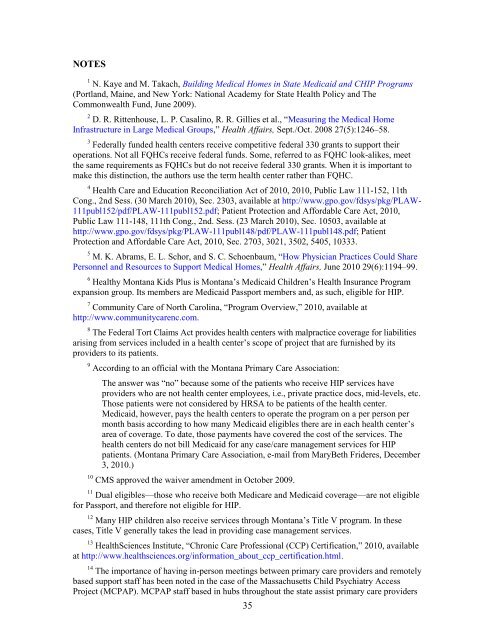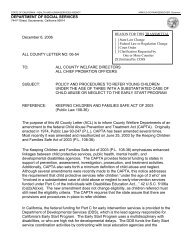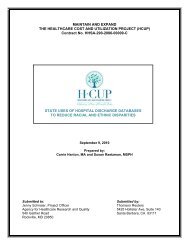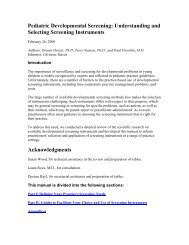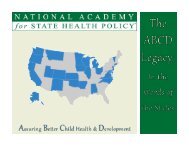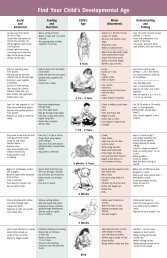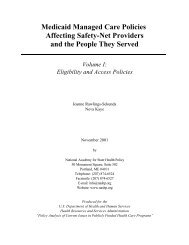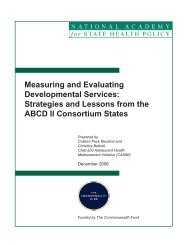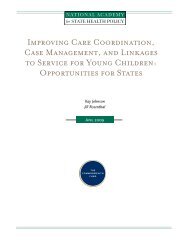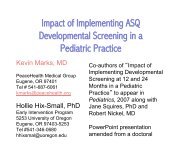Developing Federally Qualified Health Centers into Community ...
Developing Federally Qualified Health Centers into Community ...
Developing Federally Qualified Health Centers into Community ...
Create successful ePaper yourself
Turn your PDF publications into a flip-book with our unique Google optimized e-Paper software.
NOTES<br />
1 N. Kaye and M. Takach, Building Medical Homes in State Medicaid and CHIP Programs<br />
(Portland, Maine, and New York: National Academy for State <strong>Health</strong> Policy and The<br />
Commonwealth Fund, June 2009).<br />
2 D. R. Rittenhouse, L. P. Casalino, R. R. Gillies et al., ―Measuring the Medical Home<br />
Infrastructure in Large Medical Groups,‖ <strong>Health</strong> Affairs, Sept./Oct. 2008 27(5):1246–58.<br />
3 <strong>Federally</strong> funded health centers receive competitive federal 330 grants to support their<br />
operations. Not all FQHCs receive federal funds. Some, referred to as FQHC look-alikes, meet<br />
the same requirements as FQHCs but do not receive federal 330 grants. When it is important to<br />
make this distinction, the authors use the term health center rather than FQHC.<br />
4 <strong>Health</strong> Care and Education Reconciliation Act of 2010, 2010, Public Law 111-152, 11th<br />
Cong., 2nd Sess. (30 March 2010), Sec. 2303, available at http://www.gpo.gov/fdsys/pkg/PLAW-<br />
111publ152/pdf/PLAW-111publ152.pdf; Patient Protection and Affordable Care Act, 2010,<br />
Public Law 111-148, 111th Cong., 2nd. Sess. (23 March 2010), Sec. 10503, available at<br />
http://www.gpo.gov/fdsys/pkg/PLAW-111publ148/pdf/PLAW-111publ148.pdf; Patient<br />
Protection and Affordable Care Act, 2010, Sec. 2703, 3021, 3502, 5405, 10333.<br />
5 M. K. Abrams, E. L. Schor, and S. C. Schoenbaum, ―How Physician Practices Could Share<br />
Personnel and Resources to Support Medical Homes,‖ <strong>Health</strong> Affairs, June 2010 29(6):1194–99.<br />
6 <strong>Health</strong>y Montana Kids Plus is Montana’s Medicaid Children’s <strong>Health</strong> Insurance Program<br />
expansion group. Its members are Medicaid Passport members and, as such, eligible for HIP.<br />
7 <strong>Community</strong> Care of North Carolina, ―Program Overview,‖ 2010, available at<br />
http://www.communitycarenc.com.<br />
8 The Federal Tort Claims Act provides health centers with malpractice coverage for liabilities<br />
arising from services included in a health center’s scope of project that are furnished by its<br />
providers to its patients.<br />
9 According to an official with the Montana Primary Care Association:<br />
The answer was ―no‖ because some of the patients who receive HIP services have<br />
providers who are not health center employees, i.e., private practice docs, mid-levels, etc.<br />
Those patients were not considered by HRSA to be patients of the health center.<br />
Medicaid, however, pays the health centers to operate the program on a per person per<br />
month basis according to how many Medicaid eligibles there are in each health center’s<br />
area of coverage. To date, those payments have covered the cost of the services. The<br />
health centers do not bill Medicaid for any case/care management services for HIP<br />
patients. (Montana Primary Care Association, e-mail from MaryBeth Frideres, December<br />
3, 2010.)<br />
10 CMS approved the waiver amendment in October 2009.<br />
11 Dual eligibles—those who receive both Medicare and Medicaid coverage—are not eligible<br />
for Passport, and therefore not eligible for HIP.<br />
12 Many HIP children also receive services through Montana’s Title V program. In these<br />
cases, Title V generally takes the lead in providing case management services.<br />
13 <strong>Health</strong>Sciences Institute, ―Chronic Care Professional (CCP) Certification,‖ 2010, available<br />
at http://www.healthsciences.org/information_about_ccp_certification.html.<br />
14 The importance of having in-person meetings between primary care providers and remotely<br />
based support staff has been noted in the case of the Massachusetts Child Psychiatry Access<br />
Project (MCPAP). MCPAP staff based in hubs throughout the state assist primary care providers<br />
35


